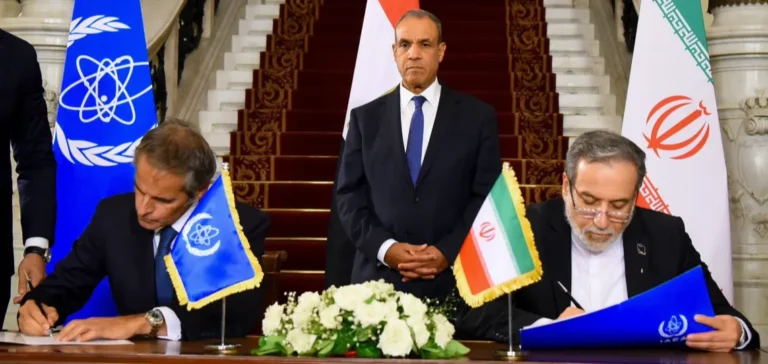Iran and the International Atomic Energy Agency (IAEA) have agreed on a new cooperation framework aimed at restarting nuclear inspections that were suspended in mid-June. The move comes amid increasing diplomatic pressure and threats of renewed sanctions from several European countries.
IAEA Director General Rafael Grossi confirmed the agreement following a meeting in Cairo with Iranian Foreign Minister Abbas Araghchi. Both parties signed a document titled “Technical Modalities for the Implementation of Inspections”, intended to formalise the resumption of monitoring activities at Iran’s nuclear sites.
Suspension of inspections since June
The agreement follows several months of deadlock after an Israeli attack on Iranian territory in June, followed by US airstrikes targeting nuclear-related facilities. In response, Tehran suspended its cooperation with the IAEA, accusing the agency of failing to condemn the bombings.
According to Iranian authorities, the decision to resume cooperation is based on a new political understanding that considers the situation created by recent military events and a critical resolution passed by the IAEA’s Board of Governors. A law passed in July by the Iranian Parliament formally bans cooperation with the agency, unless an exemption is authorised by the Supreme National Security Council.
Threat of reactivated European sanctions
The initiative comes as France, Germany and the United Kingdom — grouped as the E3 — triggered a process in late August that could lead to the reinstatement of sanctions against Iran. The 2015 nuclear agreement with world powers outlined a gradual lifting of sanctions in exchange for limits on Iran’s nuclear programme.
The legal framework allows any party to demand the return of sanctions if it believes commitments are not being fulfilled. The deal was undermined in 2018 after the United States withdrew and reinstated unilateral punitive measures. Iran subsequently reduced its cooperation with the IAEA and increased its uranium enrichment levels.
Enrichment levels under close scrutiny
The IAEA has confirmed that Iran is currently enriching uranium up to 60%, a technical threshold near the 90% required for weapons-grade material. This level remains significantly above the limits set by the 2015 agreement.
In late August, inspectors were briefly allowed access to the Bushehr nuclear plant to replace fuel, but were not granted access to facilities targeted in the June strikes. The full extent of the damage remains undisclosed.






















